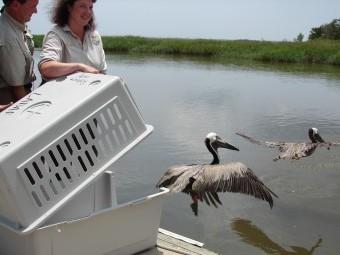
Section Branding
Header Content
Gulf Pelicans Released In Georgia
Primary Content

The US Fish and Wildlife Service released onto the Georgia coast on Tuesday 72 pelicans cleaned-up from the Gulf of Mexico oil spill.
Biologists flew the pelicans from New Orleans to Brunswick and released them at a Coast Guard station dock.
"Some of them got right down onto the water and swam away a little bit and they're still flying around the tidal creek here," says Tim Keyes, a biologist with the Georgia Department of Natural Resources. "A good flock of them caught a big thermal right over the office and got up to about 5,000 feet and then started heading south, so we'll see where they turn up."
Keyes says, the pelicans have lost their nesting season, but could stay in Georgia and nest here later.
"We'll hopefully be able to track that with these color bands on them," Keyes says. "But yeah, it's a great chance to give them a second go at it."
Biologists don't know much about what happens to pelicans after oil spills and that'll be part of what they research in the future.
It was the first release of oiled birds in Georgia and the largest so far.
Scientists treated the pelicans in the Gulf but released them here so they'd have a better chance of surviving.
Biologists also have released birds in Florida and Texas.
Tags: U.S. Fish and Wildlife Service, Department of Natural Resources, Brunswick, Georgia Department of Natural Resources, U.S. Fish and Wildlife Scientist, National Fish and Wildlife Service, GPB News, Coast Guard, Gulf Coast Oil Spill, BP oil spill, Gulf oil spill, Nancy Butler, Tim Keyes
